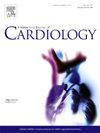Cardiovascular outcomes with SGLT-2 inhibitors in individuals with diabetes and co-existing atrial fibrillation: A systematic review and meta-analysis
IF 3.2
2区 医学
Q2 CARDIAC & CARDIOVASCULAR SYSTEMS
引用次数: 0
Abstract
Background
Type 2 diabetes mellitus (T2DM) is a major risk factor for cardiovascular disease and atrial fibrillation. Sodium-glucose cotransporter 2 inhibitors (SGLT-2i) have demonstrated benefit in reducing T2DM-related morbidity and mortality, but their effects in individuals with concomitant T2DM and atrial fibrillation remain unclear. This meta-analysis is the first to evaluate impact of SGLT-2i in this patient population.
Methods
PubMed/MEDLINE, Cochrane Library, and reference lists of the included articles were systematically searched. Results were pooled using a random-effects model and outcomes were reported as risk ratios (RR) with 95 % confidence intervals (CIs). Meta-regression analyses based on baseline patient characteristics were conducted to assess potential sources of heterogeneity.
Results
Seven retrospective cohort studies and one randomized controlled trial corresponding to 37,229 patients were included, of whom 13,030 received SGLT-2i and 24,199 received other oral anti-diabetic drugs. Follow-up ranged from 2 to 5 years. SGLT-2i use was associated with decreased risk of all-cause mortality (RR = 0.37; 95 % CI: 0.28–0.50), heart failure (RR = 0.66; 95 % CI: 0.53–0.83), stroke (RR = 0.76; 95 % CI: 0.66–0.88), and cardiovascular mortality (RR = 0.57; 95 % CI: 0.44–0.74). No significant difference was observed for myocardial infarction (RR = 0.94; 95 % CI: 0.78–1.12). Results were largely consistent across shorter (<3 years) and longer (≥3 years) follow-up durations. Meta-regression demonstrated no significant associations with baseline patient characteristics (age, gender, prior MI, or prior stroke).
Conclusion
SGLT-2i reduced all-cause mortality, heart failure, stroke, and cardiovascular mortality in individuals with T2DM and atrial fibrillation. Large-scale, randomized controlled trials are warranted to confirm these findings.
求助全文
约1分钟内获得全文
求助全文
来源期刊

International journal of cardiology
医学-心血管系统
CiteScore
6.80
自引率
5.70%
发文量
758
审稿时长
44 days
期刊介绍:
The International Journal of Cardiology is devoted to cardiology in the broadest sense. Both basic research and clinical papers can be submitted. The journal serves the interest of both practicing clinicians and researchers.
In addition to original papers, we are launching a range of new manuscript types, including Consensus and Position Papers, Systematic Reviews, Meta-analyses, and Short communications. Case reports are no longer acceptable. Controversial techniques, issues on health policy and social medicine are discussed and serve as useful tools for encouraging debate.
 求助内容:
求助内容: 应助结果提醒方式:
应助结果提醒方式:


